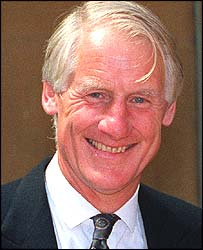Robin Butler
 | |
| Born | 1938-01-03 Lytham St Annes, Lancashire, England |
| Nationality | UK |
| Alma mater | Harrow School, University College (Oxford) |
| Children | 3 |
| Spouse | Gillian Galley |
| Member of | Intelligence and Security Committee of Parliament |
On 3 February 2004, former Cabinet Secretary Lord Butler was named as the head of the inquiry into intelligence behind the decision to go to war with Iraq. Butler served five prime ministers: Ted Heath, Harold Wilson, Margaret Thatcher, John Major and Tony Blair. He almost died with Baroness Thatcher at the Grand Hotel in Brighton when the IRA blew it up in 1984.[1]
Contents
Butler Review
The Butler Review of Intelligence on Weapons of Mass Destruction was published in July 2004. Sir John Chilcot was a member of Lord Butler’s team. The Butler report was critical of the quality of the intelligence used as a justification for the war and its public presentation but was itself criticised for pulling its punches. Evidence that has come into the public domain since the report has led to further criticism.
Why there is a case to answer
It has also been alleged that members of the Review team had a vested interest in softening the Review’s conclusions. The team had access to the highest levels of government and to many highly secret government documents. However, since it published its report a number of documents have come into the public domain that were either not covered by the report or not described accurately. It is not clear whether the Review saw all of these documents but they are vitally important as they call into question its main assumptions, including the assumption that the aim of UK policy was Iraqi disarmament and the assumption that the Joint Intelligence Committee had “authorship” of the September 2002 dossier.
Objectivity
In the New Statesman in 2008, former Defence Intelligence Staff Brian Jones wrote: “I have recently become aware that, from the outset, the Butler review team was determined to do what it could to preserve public confidence in British intelligence.”
The most serious questions arise over the influence of Ann Taylor, who was chairman of the Intelligence and Security Committee in the run up to the war. Evidence published by the Hutton Inquiry shows that she gave partisan presentational advice during the drafting of the dossier. This should have disqualified her from taking part in any inquiry on the issue but it has been alleged that she repeatedly argued for the Review’s findings to be toned down.[2]
Related Document
| Title | Type | Publication date | Author(s) | Description |
|---|---|---|---|---|
| Document:Cabinet Office Briefing Paper 21 July 2002 | briefing paper | 12 June 2005 | Generated for participants for the secret meeting of Blair’s inner circle on July 23, 2002, this classified paper states that since regime change was illegal it was "necessary to create the conditions" which would make it legal. The last page is missing. |
References
- ↑ "Profile: Lord Butler of Brockwell"
- ↑ "Iraq Inquiry Digest" Everything about the Chilcot Inquiry in one place